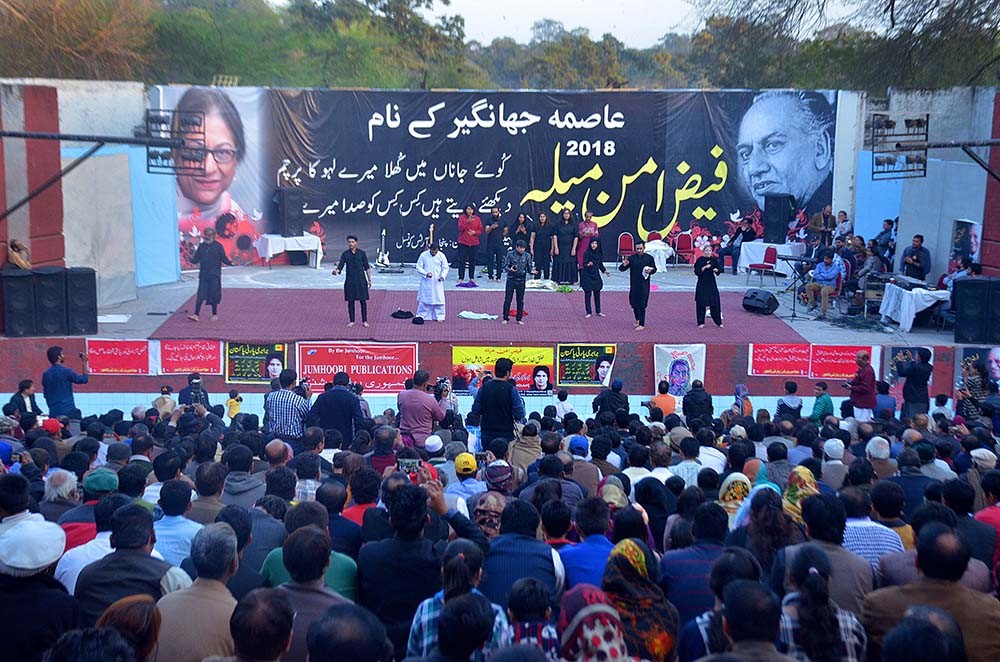
Faiz Aman Mela this year paid tributes to Asma Jahangir and Munno Bhai, while also highlighting issues around leftist politics

Hundreds of people from different walks of life showed up at the Open Air Theatre, Bagh e Jinnah, Sunday last, for Faiz Aman Mela, an annual congregation that is held to pay a tribute to the 20th century revolutionary poet of the subcontinent.
The festival, which has been a regular feature in the city since 1992, marks Faiz’s birth anniversary. This year, however, the Faiz Aman Mela Committee announced that it would be dedicated to the memories of the world renowned human rights’ activist and lawyer, Asma Jahangir, and noted playwright and columnist Munno Bhai "for their relentless struggle." Eventually, the organisers collaborated with the Awami Workers’ Party, Barabari Party, Kissan Mazdoor Party, Women Action Forum, Women’s Collective, The Feminist’s Collective, Faiz Foundation Trust, Pakistan Trade Union Defence Committee, People’s Solidarity Forum, and Progressive Students’ Collective.
A huge number of students from different educational institutions also attended the mela. They were seen chanting slogans of revolution and freedom from oppression.
The festival comprised panel talks on the issues around leftist politics and the struggle of Asma Jahangir and Munno Bhai. Besides, there were theatrical performances, and poetry recitals.
In the first session, academic Ammar Ali Jan talked about religious extremism, nationalism, and other issues prevalent in our society today. He highlighted the need to build a political struggle that revolves around the question of class, to provide an alternative to the current system.
Dr Sarah Suhail, a rights’ activist, said that the "capitalist system has reduced women to mere commodities and destroyed their relationship between men. Women must be seen as complete human beings, deserving of equal rights and privileges."
In his speech, Dr Lal Khan from Pakistan Trade Union Defence Committee threw light on the struggles of leftist politicians in Pakistan, the miseries of the poor, and the need for a socialist movement. He also praised Asma Jahangir for her bravery and struggle for democracy.
About Faiz, he said, "He is always introduced as a poet or a human rights’ activist to the masses; and his identity as a communist is always undermined."
Renowned singer Jawad Ahmad, who is also the chairman of the Barabari Party, also joined in, and said his bit on "election 2018, and the role of the left."
Haider Butt, a representative of the Progressive Students’ Collective, stressed on the importance of the students’ involvement in politics, and the ban on freedom of speech of students by the bureaucratic administrations of universities. "Given the current alienated political scenario, building solidarity between the students and the other oppressed factions of the society is the only way we can win this endless toil against oppression," he said.
Next up was a poetry session that saw the likes of Baba Najmi, Anees Ahmad, Anjum Saleemi, Azmat Malik, Irfan Ali, Sabir Ali Sabir, Afzal Sahir, and Iffat Alvi recite the verses of Faiz. They also read their own works, and paid rich tributes to the legendary poet, along with Asma Jahangir and Munno Bhai. The session was moderated by Dr Khalid Javed Jan.
Later, the PSC students presented a theatrical rendition of Faiz’s poem, ‘Pa-bajola’n chalo’ (walk with the chains in your feet), which revolves around the ban on student unions and other issues.
Talking to TNS, at the end of the performance, director Takreema Arooj said, "The students are not allowed to actively speak about their issues, as the universities have become just mediums of marketing where the students are expected to sell themselves."
The other theatrical performance of the evening was by Imran Nafees and his team. It aptly highlighted the silence on the part of the common man in the face of repression. It also touched on the issue of enforced disappearances.
The short play was followed by noted social activist and exponent of Bharatnatyam, Sheema Kirmani, performing on Faiz’s poems, ‘Umeed-e-sahar ki baat suno’ and ‘Intisaab’.
A panel talk, among Gulnar Tabassum, Imtiaz Alam, and Abid Saqi, brought the Faiz Aman Mela 2018 to a memorable close.